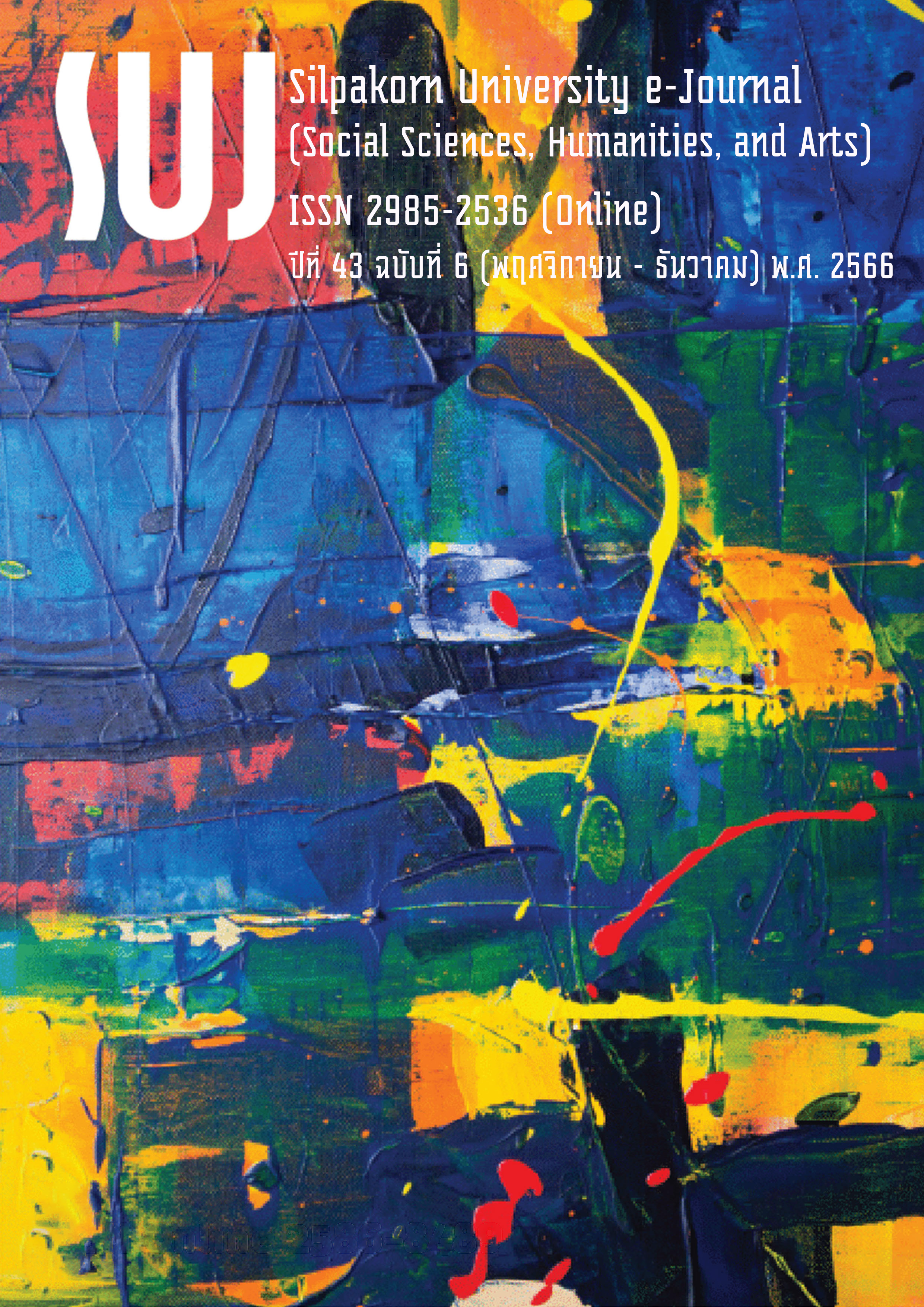มนุษยศาสตร์และสังคมศาสตร์ในศตวรรษที่ 21 (Humanities and social sciences in the 21st century)
Main Article Content
Abstract
บทความฉบับนี้เป็นปาฐกถานำในการประชุมออนไลน์ เมื่อวันที่ 21 เมษายน 2564 ซึ่งคณะอักษรศาสตร์ มหาวิทยาลัยศิลปากรเป็นผู้จัด โดยมีนักศึกษาระดับปริญญาตรีจาก 7 สถาบัน เข้าร่วมประชุม ผู้เขียนได้ปรับปรุงและขยายบทความต้นฉบับเพื่อที่จะเอื้อให้สื่อสารได้กับกลุ่มผู้รับต่างวัยและต่างวุฒิภาวะ ผู้ซึ่งมีความสนใจในบทบาทของมนุษยศาสตร์และสังคมศาสตร์ในคริสต์ศตวรรษที่ 21 ผู้เขียนจำเป็นที่จะต้องเท้าความถึงขนบอุดมศึกษาดั้งเดิมของตะวันตก เพราะอุดมศึกษาไทยได้เรียนรู้และรับรู้จากขนบตะวันตกมาเป็นส่วนใหญ่ โดยที่กลุ่มวิชาใหญ่ ๆ 3 กลุ่ม คือ วิทยาศาสตร์ สังคมศาสตร์ และมนุษยศาสตร์ ควรจะพุ่งเป้าไปสู่จุดหมายปลายทางอันเป็นอุดมคติ คือ ความสำนึกในคุณค่าของความเป็นมนุษย์ อุดมศึกษาไทยยังอยู่ในกระบวนการแสวงหาอัตลักษณ์ของตนเอง และในบางครั้งก็หลงทางไปสู่ความเข้าใจผิดในเรื่องของวิชาการและในเรื่องของการจัดการ ในขณะที่แก่นแท้ของการศึกษาไทย ซึ่งตั้งอยู่บนรากฐานของวิทยาทานและสัมพันธภาพแนวนอนในระดับชุมชนถูกมองข้ามไป และก็เพิ่งจะมีการเริ่มทำความเข้าใจและรื้อฟื้นวัฒนธรรมไทยในด้านนี้ขึ้นมา ศตวรรษที่ 21 ถูกบีฑาด้วยกิเลสนานัปการ โดยที่มีการใช้วิทยาศาสตร์และเทคโนโลยี โดยเฉพาะเทคโนโลยีดิจิทัลไปในทางที่ผิด ๆ และผลที่ตามมาคือ ความล่มสลายของธรรมชาติในรูปแบบต่าง ๆ ที่เราเริ่มจะมองเห็น และเราก็เพิ่งจะตื่นตัวขึ้นรับหลักการของการอ่อนน้อมถ่อมตนและจริยธรรม การเรียนรู้วิชาแต่ถ่ายเดียวไม่พอเสียแล้ว และศิลปะของการเรียนวิธีการเรียนรู้ ซึ่งมนุษยศาสตร์และสังคมศาสตร์ได้พยายามจะสนับสนุนให้เกิดขึ้นมานานแล้ว กำลังจะกลายเป็นทิศทางหลักของยุคใหม่
The present paper was an inaugural lecture delivered at an online conference on April 21, 2021, organized by the Faculty of Arts, Silpakorn University, with the participation of undergraduates from seven Thai institutions. The author has revised and expanded the original lecture to facilitate communication with a diverse audience of varying intellectual maturities who may be interested in the role of the humanities and social sciences in the 21st century. Anchoring the various disciplines in the Western tradition of higher education, from which the Thai counterpart has drawn significantly, the author demonstrates how the three main groups of subjects should logically and ideally converge toward the ultimate goal of fostering an awareness of human values. Thai higher education has wrestled with the challenge of defining its identity, often veering into misconceptions regarding certain disciplines as well as modes of management. Meanwhile, the essence of Thai education, rooted in selfless giving and horizontal relationship at the community level, has been overlooked and is only recently being rediscovered and reintegrated. The present century, having allowed itself to be misled by science and technology, and particularly digital advancements, has been plagued by material greed, thereby precipitating various kinds of natural disasters. It is now beginning to awaken to the importance of humility and ethics. Mere knowledge-based learning no longer suffices, and the art of learning how to learn – a skill long cultivated by the humanities and social sciences – is now becoming the order of the day.
Downloads
Article Details

This work is licensed under a Creative Commons Attribution-NonCommercial-NoDerivatives 4.0 International License.
References
Banomyong, Pridi. (2015). The Delegitimization of War: Unpublished Historical Records by the Senior Statesman (โมฆสงคราม : บันทึกสัจจะประวัติศาสตร์ที่ยังไม่เคยเปิดเผยของรัฐบุรุษอาวุโส). Bangkok: Pridi Banomyoung Foundation.
Hans Küng. (n.d.). In Wikipedia. [Online]. Retrieved July 19, 2023 from https://en.wikipedia.org/wiki/Hans_Küng
Kant, I. (1798). The Conflict of the Faculties (Der Streit der Facultäten). [Online]. Retrieved July 19, 2023 from https://www.projekt-gutenberg.org/kant/streit/streit.html [in German]
Khamson, Aurapin. (2022). 13 October 2016 and the Renaissance of Thai Art (13 ตุลาคม 2559 กับความเบ่งบานของศิลปะไทย). Nakhon Pathom: Silpakorn University Printing House.
Nagavajara, Chetana. (1995). Foundation of Humanities Research (พื้นฐานการวิจัยทางมนุษยศาสตร์). In Towards a Critical Culture (ทางไปสู่วัฒนธรรมแห่งการวิจารณ์), 2nd ed. (pp. 258-285). Bangkok: Manager Press.
Nagavajara, Chetana. (2003). In Search of Indigenous Theories (แนวทางการสร้างทฤษฎีศิลปะจากแผ่นดินแม่). In S. Kriengkraipetch (Ed.), Art Lights the Way: Collected Articles (ศิลป์ส่องทาง: รวมบทความวิชาการ), (pp. 101-126). Bangkok: Combang Press.
Nagavajara, Chetana. (2011). The loquacious turn or the importance of being secondary. Journal of Liberal Arts Prince of Songkla University, 3(2): 1-9.
Nagavajara, Chetana. (2013). From Selfless Giving to Commodification: The Dilemma of Higher Education (จากวิทยาทานสู่การผลิตและจำหน่ายสินค้า: ความปั่นป่วนของอุดมศึกษา). Bangkok: Knowledge Network Institute of Thailand.
Nagavajara, Chetana. (2016). Mourning Becomes the Thai People: October 13th and an Artistic Renaissance (พระราชาพาให้ศิลปะเกิดใหม่). [Online]. Retrieved July 19, 2023 from https://www.thaicritic.com/?p=3679
Nagavajara, Chetana. (2022). Informality in Life and Art: A Critical Viewpoint (ลักษณะที่ไม่เป็นทางการในชีวิตและศิลปะ : ข้อคิดเชิงวิพากษ์). In D. na-Pombejra, A. Khamson, & T. Weerakietsoontorn (Eds.), Interweaving of Ideas: Festschrift for Winai Pongsripian (ถักทอความคิด มิตรและศิษย์มอบให้ วินัย พงศ์ศรีเพียร), (pp. 15-40). Nakhon Pathom: Silpakorn University Printing House.
Nagavajara, Chetana. (2023). On the role of the teacher in contemporary society (ข้อคิดว่าด้วยความเป็นครูแห่งยุคสมัย). Journal of Learning Sciences and Education, 2(1): 1-38. [Online]. Retrieved July 19, 2023 from https://so07.tci-thaijo.org/index.php/JLSEd/article/view/2775/1922
Na Thalang, Siraporn. (2022). Inspirations from Professor Chetana Nagavajara (แรงบันดาลใจที่ได้รับจากศาสตราจารย์ ดร.เจตนา นาควัชระ). In S. Chaiprasathna, S. Tongurai, A. Khamson, K. Thanompunyarak, & M. Lake (Eds.), Chetana@84: Improvising His Way Through Life (เจตนา 84 ปี : ด้นชีวีคลี่ชีวิต), (pp. 227-228). Bangkok: Combang Press.
Neate, Rupert. (2023). Joseph Stiglitz: Tax High Earners at 70% to Tackle Widening Inequality. The Guardian. [Online]. Retrieved January 22, 2023 from https://www.theguardian.com/news/2023/jan/22/joseph-stiglitz-economist-income-tax-high-earners-70-per-cent-inequality
Shoocongdej, Rasmi. (2022). Professor Chetana Nagavajara as a Source of Contemporary Archaeology (ศาสตราจารย์ ดร.เจตนา นาควัชระ ในฐานะของหลักฐานทางโบราณคดีร่วมสมัย). In S. Chaiprasathna, S. Tongurai, A. Khamson, K. Thanompunyarak, & M. Lake (Eds.), Chetana@84: Improvising His Way Through Life (เจตนา 84 ปี: ด้นชีวีคลี่ชีวิต), (pp. 190-213). Bangkok: Combang Press.
Stiglitz, J. E. (2019). Capitalism and Its Discontents. The Times Literary Supplement. [Online]. Retrieved July 19, 2023 from https://www.the-tls.co.uk/articles/capitalism-ethical-economics-joseph-stiglitz/


